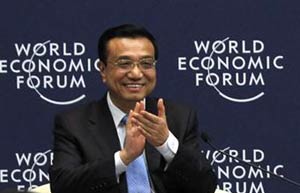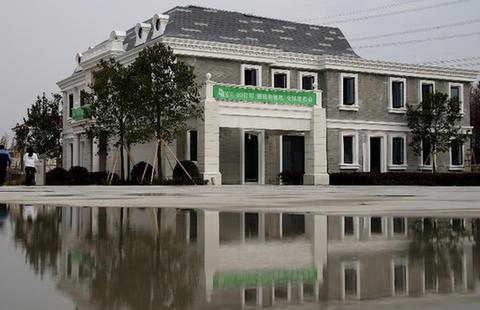Lin: Recession risks rising in Europe
By FU JING (China Daily) Updated: 2014-09-10 07:56
 |
|
Chinese economist Justin Yifu Lin delivers a speech after recieving an honorary doctorate awarded by the Vlerick Business School and the Catholic University of Leuven in Belgium on Monday evening. [Photo provided to chinadaily.com.cn] |
More structural reforms necessary to avert crisis, says top economist
Europe now faces the risk of another recession, its third since the global economic crisis of 2008-09, and such a development would lead to a fall in exports and investment from China to the region, said former World Bank chief economist Justin Yifu Lin.
"The risk cannot be removed right now as the European Union (especially the eurozone) has not come up with the requisite structural reforms to improve its competitiveness," Lin, a leading adviser to the Chinese government and professor at Peking University, told China Daily in Brussels.
Lin was awarded an honorary doctorate by the Vlerick Business School and the Catholic University of Leuven in Belgium on Monday evening in recognition of his standing as one of China's top economists.
Lin's concern came after the eurozone's real GDP, according to the European Central Bank, remained unchanged in the second quarter of this year compared with the previous quarter. It also followed Germany and Italy reporting GDP declines by 0.2 percent in the second quarter, compared with the first quarter of this year.
The European economy has already experienced two recessions-in 2008-09 and 2010-11. To help wake up the economy, the European Central Bank cut its interest rate further last week, and consequently the exchange rate of the euro against the yuan fell to a new low of 7.95 on Monday compared with 8.68 on May 8.
Lin said the further depreciation of the euro, as a result of the loose monetary policies, would help boost exports from the EU.
However, the eurozone's competitiveness, according to the traditional formula used by multilateral lending institutions like the International Monetary Fund, should be a result of further structural reforms. Financial and debt crises, do not have their own currency. So if one were to use the conventional definitions it means currency deprecation in the entire eurozone," he said.
"If the eurozone currency depreciates further, this would cause a 'competitive depreciation of the dollar', which is something that the global economy is not prepared for," Lin said.
Lin's views on economic prospects within the EU found support from Duncan Freeman, a senior research fellow of the Brussels Institute of Contemporary China Studies.
Freeman said the eurozone is struggling to maintain growth, and recent figures show that it has been very poor or nonexistent.
"There is a real danger that growth will slip into negative territory," said Freeman.
 |
 |
| Premier Li to attend Summer Davos forum |
|
- Chinese stocks dive most in 7 years
- Consumer should be the main driving force
- Regulator signals no change in market rules
- Overseas listing of domestic firms to be made easy
- Regulator issues draft rules restricting entrusted loans
- Mercedes-Benz: Reduced prices for parts, free checkups
- First private bank starts trial operation
- BMW Brilliance's ZINORO charging into Shanghai
















